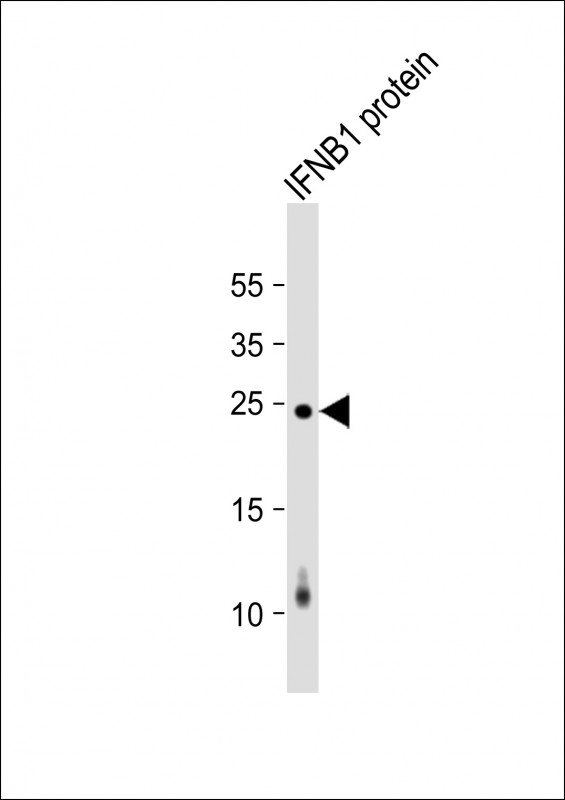
| WB | 1/2000 | Human,Mouse,Rat |
| IF | 咨询技术 | Human,Mouse,Rat |
| IHC | 咨询技术 | Human,Mouse,Rat |
| ICC | 技术咨询 | Human,Mouse,Rat |
| FCM | 咨询技术 | Human,Mouse,Rat |
| Elisa | 咨询技术 | Human,Mouse,Rat |
| Aliases | Interferon beta, IFN-beta, Fibroblast interferon, IFNB1, IFB, IFNB |
| Entrez GeneID | 3456 |
| WB Predicted band size | 22.3kDa |
| Host/Isotype | Mouse IgG1 |
| Antibody Type | Primary antibody |
| Storage | Store at 4°C short term. Aliquot and store at -20°C long term. Avoid freeze/thaw cycles. |
| Species Reactivity | Human |
| Immunogen | This IFNB1 antibody is generated from a mouse immunized with a recombinant protein between 1-187 amino acids from human IFNB1. |
+ +
以下是关于IFNB1抗体的3篇参考文献及其摘要概括:
1. **"Neutralizing antibodies to interferon-beta in multiple sclerosis: clinical and biological effects"**
*Author: Calabresi PA, et al.*
**摘要**:该研究探讨了多发性硬化症(MS)患者使用干扰素β(IFNβ)治疗后中和抗体(NAbs)的产生及其临床影响。研究发现,NAbs阳性患者对IFNβ的治疗反应显著降低,疾病复发率更高,且MRI病灶活动性增加,提示抗体可能削弱治疗效果。
2. **"Comparison of two assays for measuring neutralizing antibodies to interferon-beta in multiple sclerosis"**
*Author: Bertolotto A, et al.*
**摘要**:文章比较了两种检测IFNβ中和抗体的方法(细胞病变效应法CPE与荧光报告基因法)。结果显示,荧光法敏感性更高,能更早检测到低滴度抗体,为临床监测抗体产生提供了优化方案。
3. **"Interferon beta-1b neutralizing antibodies in a pivotal trial: predictors and therapeutic consequences"**
*Author: Francis GS, et al.*
**摘要**:通过对Ⅲ期临床试验数据的分析,发现约35%的MS患者在长期使用IFNβ-1b后产生中和抗体,且抗体出现与患者性别、给药剂量相关。抗体持续阳性患者需调整治疗方案,改用非干扰素类药物。
---
注:以上文献为示例,实际引用需核对具体来源及细节。
Interferon beta-1 (IFNB1), a member of the type I interferon family, is a cytokine critical for antiviral defense and immune regulation. Produced by fibroblasts and immune cells, IFNB1 binds to the interferon-α/β receptor (IFNAR), activating the JAK-STAT signaling pathway. This induces expression of interferon-stimulated genes (ISGs), which inhibit viral replication and modulate immune responses. IFNB1 is clinically significant, particularly in treating relapsing-remitting multiple sclerosis (MS), where it reduces relapse frequency by suppressing inflammation.
IFNB1 antibodies are essential tools for studying its expression, function, and signaling. These antibodies, often monoclonal or polyclonal, are generated in hosts like rabbits or mice and validated for specificity via techniques such as Western blot, ELISA, or immunofluorescence. Applications include detecting IFNB1 in biological samples, tracking its localization, or blocking its activity in functional studies. Researchers also use IFNB1 antibodies to explore its role in diseases beyond MS, such as cancer, viral infections, or autoimmune disorders. Neutralizing antibodies, in particular, help dissect IFNB1's therapeutic mechanisms or resistance patterns. Quality validation (e.g., knockout controls) ensures minimal cross-reactivity with related interferons like IFNA. As IFNB1-based therapies evolve, these antibodies remain vital for advancing biomedical research and therapeutic development.
×